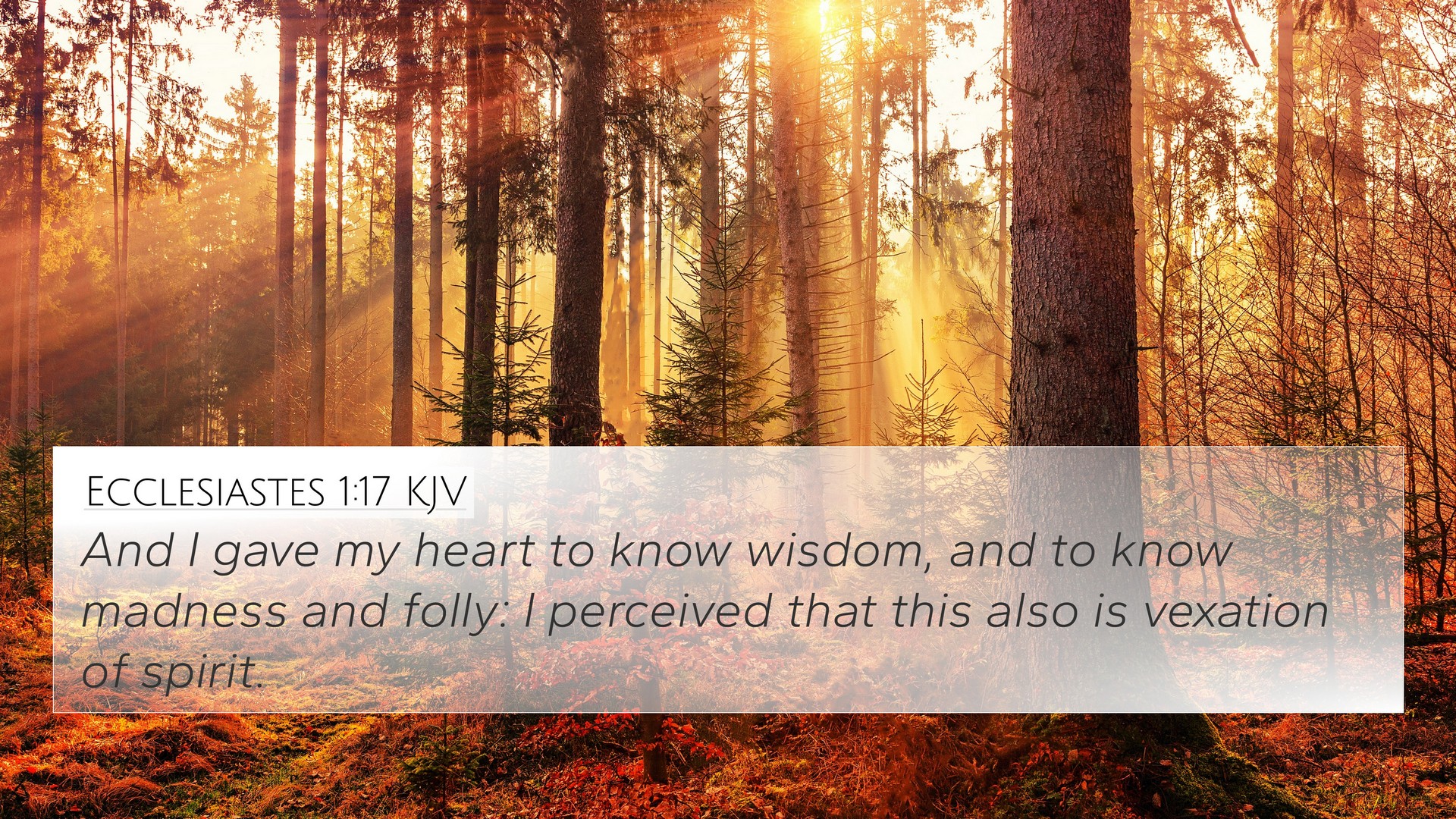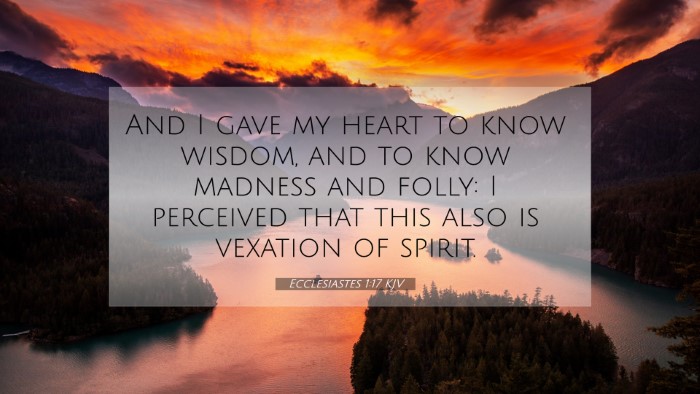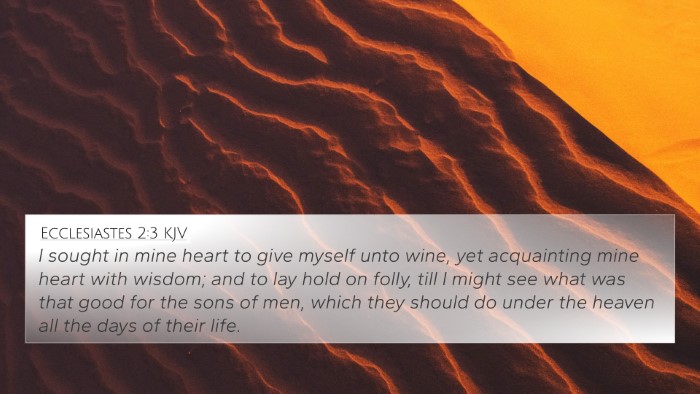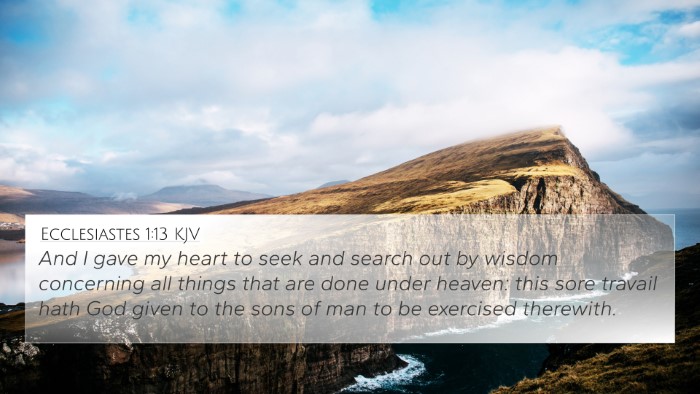Understanding Ecclesiastes 1:17
Ecclesiastes 1:17: "And I gave my heart to know wisdom, and to know madness and folly: I perceived that this also is vexation of spirit."
This verse captures the essence of the author's quest for understanding and the complexities of life. It emphasizes the pursuit of wisdom while acknowledging the futility of seeking enlightenment through folly and madness.
Summary of Insights
The verse reflects the struggle between the search for wisdom and the realization that many pursuits in life are ultimately temporary or futile. The author, traditionally believed to be King Solomon, expresses a deep existential awareness.
Commentary Insights
- Matthew Henry: Henry emphasizes the vanity of human wisdom compared to divine wisdom. He underscores that even the pursuit of wisdom becomes a source of vexation when it is not allied with the fear of God.
- Albert Barnes: Barnes notes that the search for knowledge often leads to frustration. He suggests that wisdom may be unproductive and that those who seek only knowledge of things outside of God often end up disillusioned.
- Adam Clarke: Clarke elaborates on the duality of wisdom and folly. He mentions how understanding both enables one to recognize the limitations and imperfections of human knowledge and experience.
Connections Between Bible Verses
Ecclesiastes 1:17 can be related to several other verses throughout the Bible, showcasing a thematic connection concerning wisdom, folly, and the human condition.
- Proverbs 1:7: "The fear of the Lord is the beginning of knowledge: but fools despise wisdom and instruction."
- Proverbs 21:30: "There is no wisdom nor understanding nor counsel against the Lord."
- 1 Corinthians 1:25: "Because the foolishness of God is wiser than men; and the weakness of God is stronger than men."
- James 1:5: "If any of you lack wisdom, let him ask of God, that giveth to all men liberally, and upbraideth not; and it shall be given him."
- Ecclesiastes 2:15: "Then said I in my heart, As it happens to the fool, so it happens even to me; and why was I then more wise?"
- Isaiah 29:14: "Therefore, behold, I will again do a marvelous work among this people, a marvelous work and a wonder; for the wisdom of their wise men shall perish, and the understanding of their prudent men shall be hidden."
- Psalms 37:30: "The mouth of the righteous speaks wisdom, and his tongue talks of justice."
Thematic Connections Through Cross-Referencing
The exploration of wisdom, folly, and the human experience found in Ecclesiastes 1:17 opens many doors for thematic Bible verse connections. Cross-referencing enhances our understanding of how these concepts resonate throughout the scriptures.
Cross-Referencing Biblical Texts
Utilizing tools for Bible cross-referencing deepens insight. Through comparative Bible verse analysis, one can identify profound links between wisdom and folly across both Old and New Testament scriptures. Here are some methods for effective Bible cross-reference study:
- Utilize a Bible Concordance: Helps in finding corresponding themes and concepts across verses.
- Engage in Cross-Reference Bible Study: Encourages exploration of related verses to gather a holistic understanding.
- Examine Bible Reference Resources: Such as study Bibles that provide notes on connecting scriptures.
- Analyze Comparative Studies: Focus on specific themes, like the nature of wisdom, throughout various texts.
- Explore Themes in the Gospels: Identify how wisdom is treated and interpreted within the teachings of Christ.
User Intent Keywords & Related Questions
When exploring Ecclesiastes 1:17, individuals might ask:
- What verses are related to Ecclesiastes 1:17?
- How do Proverbs connect with Ecclesiastes in terms of wisdom?
- What Biblical texts support the themes presented in Ecclesiastes 1:17?
- How does Ecclesiastes dialogue with New Testament teachings about wisdom?
Conclusion: The Importance of Wisdom in Ecclesiastes
In examining Ecclesiastes 1:17 and its cross-references, we see a deeply human narrative about the search for wisdom and the acknowledgement of its limits. The exploration of connections between Bible verses not only enriches our understanding of this specific verse but also allows for a broader thematic interpretation throughout Scripture. Embracing the lessons from this passage encourages us to seek divine wisdom while recognizing the limitations of human knowledge.







